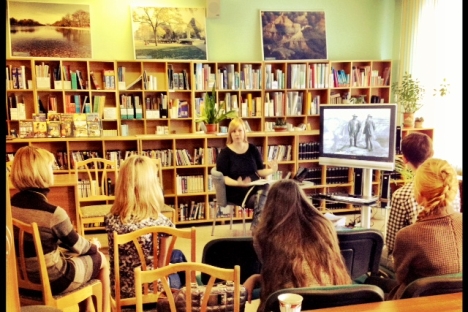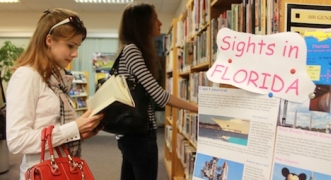Stepping up U.S.-Russia environmental cooperation
![Every year volunteers come to the streets to clean parks from garbage in Moscow [pictured] and other cities and local communities. Source: Muzeon Park of Arts](https://mf.b37mrtl.ru/rbthmedia/images/web/en-rbth/images/2013-06/big/cleaning_day_moscow_468.jpg)
Every year volunteers come to the streets to clean parks from garbage in Moscow [pictured] and other cities and local communities. Source: Muzeon Park of Arts
Sarah Ziebell, information resource officer at the U.S. Embassy in Moscow, traveled to three Russian cities - Arkhangelsk, Rostov-na-Dony, and Kaliningrad - to spread ecological awareness among Russians and foster U.S.-Russia environmental ties. She talked to RBTH about her experience.
Russia Beyond The Headlines: Could you describe your environmental project and its goals, in a nutshell?
Sarah Ziebell: Throughout the month of May, in my capacity as a public diplomacy outreach officer for the American Embassy in Moscow, it was my great pleasure to be able to travel to three wonderful Russian cities for the first time: Arkhangelsk, Rostov-na-Dony, and Kaliningrad.
In each of the cities, I visited community libraries where we have had long-standing relationships through our Russian American Center, Corners, and Shelves program and spoke with audiences about a topic that is of great mutual interest: environmentalism.
My presentations were anchored around a photographic exhibit that we opened at Embassy Moscow in April, “A Necessity: Americans and the Development of Environmental Consciousness,” which charted some key moments in U.S. history related to Americans’ growing awareness of the imperative that each one of us has to make sure our lands, waters, and air are protected for future generations.
Related:
Spring clean-up revives concept of mass spring cleaning
Volunteers clean Siberian city of litter
New industry of household waste disposal to emerge in Russia
"I used the images from this exhibit to lead lively discussions in each of the cities I visited about these issues, which are of just as much importance to Russians as they are to Americans.
The goal of these programs was two-fold: first, to increase understanding of the American experience as it relates to environmental issues, and second, to open a dialogue between American and Russian people about practical strategies for protecting our environment.
RBTH: To what extent do they strengthen U.S.-Russia environmental issue collaboration?
S.Z.: I think that awareness and dialogue are the first steps in moving toward enhanced collaboration on these important matters. It was also fascinating to me to hear about Russian initiatives, particularly some of the projects that local communities have undertaken to encourage recycling, clean up neighborhoods, and stimulate interest in gardening, cycling, and other environmentally-friendly pursuits.

U.S. Embassy official Sarah Ziebell taking the floor in an American Corner in Arkhangelsk. Source: Sarah Ziebell / Personal archive
RBTH: Why should environment be one of the top priorities in U.S.-Russia bilateral agenda?
S.Z.: Both of our countries are so rich in natural resources, but also so industrially ambitious. Therefore, collaboration in strategy is critical for the protection of our planet.
RBTH: What environmental challenges should the U.S. and Russia address together?
S.Z.: There are many challenges that our nations could (and often, already do) address jointly related to environmental protection - clean air, clean water, lands and wildlife conservation. However, what is perhaps more immediately relevant to my work is the value of information sharing, person-to-person: exchanging local ideas that can help people get more engaged with their natural surroundings and take more of an interest in protecting them."
RBTH: How can American Corners deepen U.S.-Russia environmental collaboration?
S.Z.: Libraries, including those Russian libraries where we are fortunate to have American Corners, are great conveners for the exchange of ideas in relaxed surroundings. Additionally, they themselves can be great catalysts for action.
For example, the Central Library in Kaliningrad, where we have an American Corner and where I recently spoke, long has organized community recycling activities. More recently, Kaliningrad has become involved in an exciting international movement called “Cycling for Libraries” that brings awareness to the value of libraries and literacy but also to the joys of cycling. A perfect combination!
RBTH: Did your expectations come true after the presentations?
S.Z.: These presentations were just the start of what I hope might be a continued discussion of these matters. I would certainly like to continue to visit other cities in Russia and learn about how those regions are tackling these serious issues. I am hopeful that we might find ways to further collaborate and am grateful for the opportunity.
All rights reserved by Rossiyskaya Gazeta.
Subscribe
to our newsletter!
Get the week's best stories straight to your inbox
